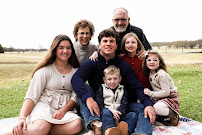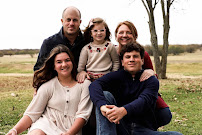Texas Health Resources - Dallas Presbyterian
Writes Article on Jenna
Leaning on Each Other at Texas Health Dallas
Into every evening, long after her day ends and her children are in bed, Jenna Hermann, B.S.N., R.N., stays in touch with her ICU nurses at Texas Health Presbyterian Hospital Dallas, who are caring for patients awaiting COVID-19 test results.
“They're here caring for complete strangers — because that’s what their passion is — but they also know they’re going home to their families and they wonder, ‘Am I putting my family at risk?’” Jenna who is medical intensive care unit manager and surgical intensive care unit interim manager, oversees about 80 employees, 70 of them nurses.
“There’s also the unknown factor. This virus is new to the U.S., and that’s a stressor — trying to navigate those waters,” she said.
Jenna, who has been at Texas Health Dallas in the ICU since she started as an intern in 2007, hits the ground running every morning at about 6:15 a.m., checking on her staff, rounding on the unit — and listening.
“I’m really proud of my teams and care they provide to our patients and families.”
They count on her for answers to everything from emotional needs to supplies.
A Voice and an Advocate
Her days, sometimes 15 hours long, are filled with staffing decisions, clinical decisions about what’s best for patients and the safety of nurses, looking at processes and protocols used at the bedside.
“If they have concerns, I escalate them to the appropriate department and I’m really just there for them, to help and support them. I don’t spend time in my office anymore. My priority is my staff and making sure they have everything they need.
“They come to me with their fears, concerns, stresses. All I can do is listen and try to be their voice and advocate for their concerns and needs, using the hospital’s resources the best I can to support them.”
And fear, she said, is “definitely real and relevant. It’s the unknown. But we all became a nurse to care for people and help people. And we just show up each day doing what we’re trained to do.”
Finding Support
Support can come from many places: each other, the hospital leadership and Texas Health Resources as a system, Jenna said. She said she learned that lesson in 2014, when the Ebola event occurred at Texas Health Dallas.
“I really learned about how a unit and the organization and the system really come together and support each other and do what needs to be done,” she said. “During the long hours I just felt so much support from Texas Health Dallas, Texas Health Resources and even from the community.”
The support she said, came from top leadership down to the unit level. It was about leaders’ “presence, rounding, being able to call on them, getting food in, whatever the need was, they met it.”
Today, during the COVID-19 crisis, Jenna looks to the same sources for support, and also to her nursing colleagues at the hospital.
“My therapy is talking it out amongst my coworkers. We have a support system at work — we’re all people going through the same thing. That’s my own personal coping mechanism: leaning on each other.”































No comments:
Post a Comment